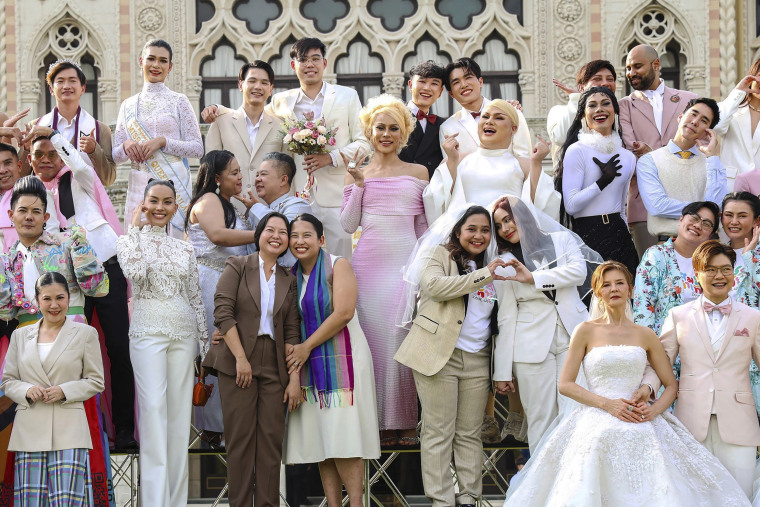BANGKOK — They have been in a committed relationship for more than 13 years and even got married in 2019. Since then, Danaya Phonphayung and Sunma Piamboon, both women, consider themselves a married couple, even though same-sex marriages were not legally recognized .
The walls of their home on the outskirts of Bangkok are decorated with faded photos of their happy union, filled with joy and love from their families and friends. This coming Thursday, their marital status will also be recognized by the nation, when a law allowing members of the LGBTQ community in Thailand to marry and enjoy the same legal rights as heterosexual couples comes into force.
The couple said they couldn’t wait to make their union official. They plan to register their marriage at a district office near their home on the first day permitted by law.
“I think I’m going to cry,” Danaya, an office worker, said with a big smile, thinking about the moment they sign the paper. “I’m so happy. It’s something more than I could have dreamed of, that suddenly this day is coming.
“We live together. We bought a house. We bought a car. But we can’t share these things together like a married couple. When this happens, we believe that it is our rights that we must guarantee as quickly as possible,” she said.
The Marriage Equality Bill, which passed the House and Senate, amended the Civil and Commercial Code to replace the words “men and women” and “husband and wife” with “individuals.” and “spouses in marriage.” This would open access to full legal, financial and medical rights to LGBTQ couples.
Sunma, a travel agency owner, said she realized how crucial it was to be legally married when Danaya was hospitalized with dengue fever because they don’t live near her parents.
“The doctors asked me who I was, and I said I was the girlfriend, and they said ‘so what?’ I couldn’t make any decisions until her condition became very serious,” she said “I was so upset, as if I had lost her… there would be nothing that could have made up for it. So I think it’s very important for both of us.
How Marriage Equality Became Law
Thailand has a reputation for acceptance and inclusiveness, but it has struggled for decades to pass a marriage equality law. Thai society largely upholds conservative values. Members of the LGBTQ community say they face discrimination in everyday life, although they note that things have improved greatly in recent years.
The Pheu Thai Party-led government has made marriage equality one of its main goals. She made a major effort to identify with the annual Bangkok Pride parade in June, in which thousands celebrated in one of Bangkok’s busiest commercial districts.
Last week, Government House invited dozens of LGBTQ couples and activists for a photoshoot and meeting with Prime Minister Paetongtarn Shinawatra and several senior officials to celebrate the law taking effect, making Thailand first in Southeast Asia and third place in Asia. , after Taiwan and Nepal, to legalize same-sex marriage.
“It’s almost like a dream, but it’s not. So congratulations to everyone,” said Paetongtarn. “I think it’s very important for the world to notice us and know that in this small country we have this kind of thinking. We have this kind of support for our people. So we should all be proud.

Bangkok Pride organizers have collaborated with relevant government agencies to organize a grand celebration in central Bangkok and support couples who want to register their marriage from day one. They said more than 300 couples registered to officially get married Thursday at the event.
“(The law) is about giving us back our dignity and confirming that we also have dignity as a human being,” said Ann “Waaddao” Chumaporn, a gender equality activist and lead organizer of the Bangkok Pride. “This day will be meaningful for all the couples who have experienced this journey together. I would like to thank everyone, every love, who faithfully fought to make today finally happen.
How the law will be applied
The government and state agencies in Thailand have historically had a traditional outlook. To prepare them for the change, the Bangkok Metropolitan Administration said it had held workshops for staff in all district offices in Bangkok responsible for handling marriage registration. They included talks raising awareness of gender diversity and advice on how to properly communicate with those who come to attend the service.
“It’s like a missing piece of the puzzle,” Bangkok Deputy Governor Sanon Wangsrangboon said during one of the workshops earlier this month. “The company is ready. The law is being prepared. But the last piece of the puzzle lies in understanding those responsible.”
He acknowledged there would be problems at first, but said he hoped those problems would gradually improve over time.
After registering their marriage, Sunma said she was looking forward to having a “real wedding celebration” with her and Danaya’s families.
“It’s not just the two of us who are happy, but both of our families think it’s a big deal, and it’s what everyone was waiting for. Everyone said they were waiting for January 23,” she said.


